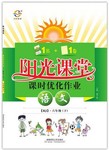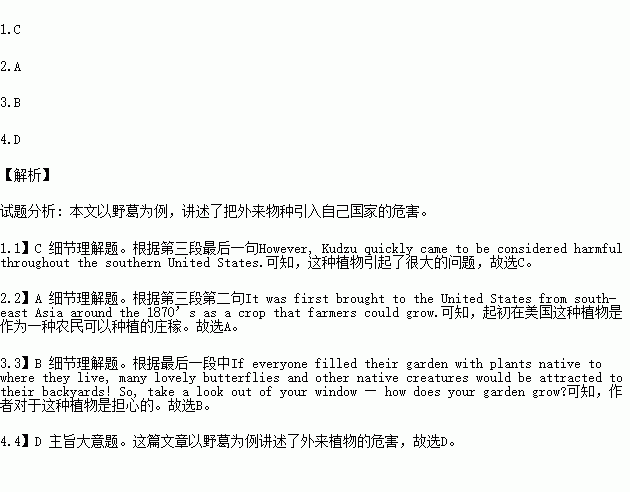题目内容
Today, many people use plants from other places to design their yards. Well, do they have any influence on animals living nearby? As we know, plants supply food for things like insects and plant-eating animals. In turn, birds and meat-eating animals feed on these insects and plant-eating animals. It is easy to see how important plants are.
Although foreign plants may look beautiful, they can cause problems when there are too many of them. I live in Virginia, USA, and sometimes see a plant—commonly known as Kudzu—that seems to cover everything in the area, even climbing over whole trees and houses.
Kudzu is an unbelievable plant since it grows very fast. It was first brought to the United States from south-east Asia around the 1870’s as a crop that farmers could grow. However, Kudzu quickly came to be considered harmful throughout the southern United States.
Since Kudzu grows fast in many different environments, it can completely cover areas of land quickly. The plant is also not eaten by any insects or birds in the United States so it can grow unchecked. Kudzu can cover trees, bushes, and even houses. It costs the United States 500 million dollars a year to just keep Kudzu from growing too fast. The plant is a perfect example of what scientists call an invasive (侵略性的) species, which grows more quickly than other native plants.
All foreign plants have the possibility to spread quickly. Not only are they costly, but planting them in gardens actually takes away food from insects. If everyone filled their garden with plants native to where they live, many lovely butterflies and other native creatures would be attracted to their backyards! So, take a look out of your window — how does your garden grow?
1.We can learn from the text that Kudzu in Virginia ________.
A. is very popular
B. is difficult to grow
C. can cause big trouble
D. can make air cleaner
2.Which of the following is TRUE of Kudzu?
A. It served as food at first in America.
B. It came to America in the early 19th century.
C. It grows fast in Asia, but slowly in America.
D. It is often eaten by insects or birds in America.
3.How does the author sound when telling of these foreign plants?
A. Sad.B. Worried.C. Proud.D. Excited.
4.What does the author mainly discuss in the text?
A. Everyone should learn to love nature.
B. It is a hard job to grow plants in yards.
C. Gardening has become a serious hobby.
D. It is important to say no to foreign plants.
 阳光课堂课时优化作业系列答案
阳光课堂课时优化作业系列答案假设你是李华,今年将要参加高考。你想在大学里学习外语专业,但是你的老师和父母都对你的选择提出了异议,对此你很苦恼。请你根据下表提示,用英语给你的英国笔友David发一封邮件,谈谈关于你的专业选择问题,并寻求帮助。
建议 | 专业 | 理由 |
父母的建议 | 金融 | 将来从商,为在商界工作做准备 |
老师的建议 | 法律 | 就业前景好 |
你的想法 | 外语 | 充分发挥自己的语言天赋 |
注意:
1. 词数100左右; 2. 可适当增加细节,以使行文连贯;
3. 信的开头和结尾已给出,但不计入总词数。
Dear David,
I am at a loss nowadays.
I’m looking forward to your early reply.
Yours,
Li Hua

